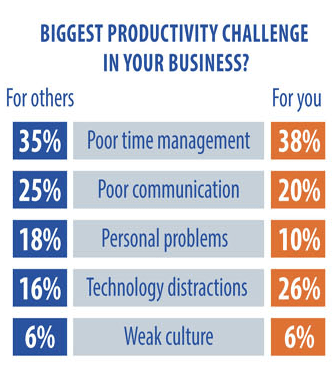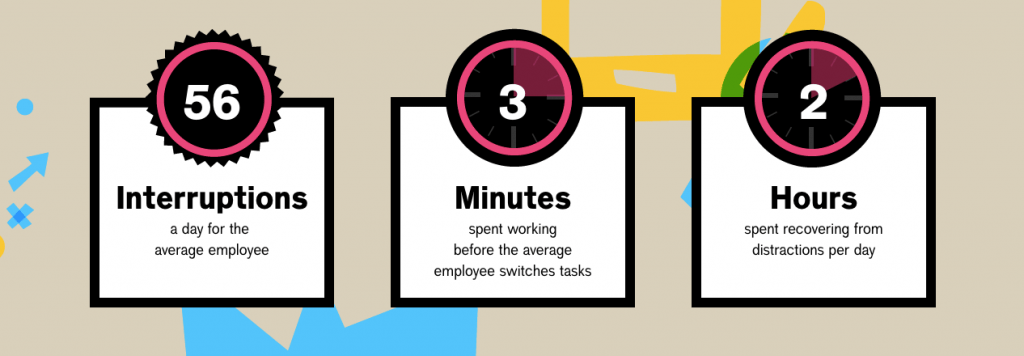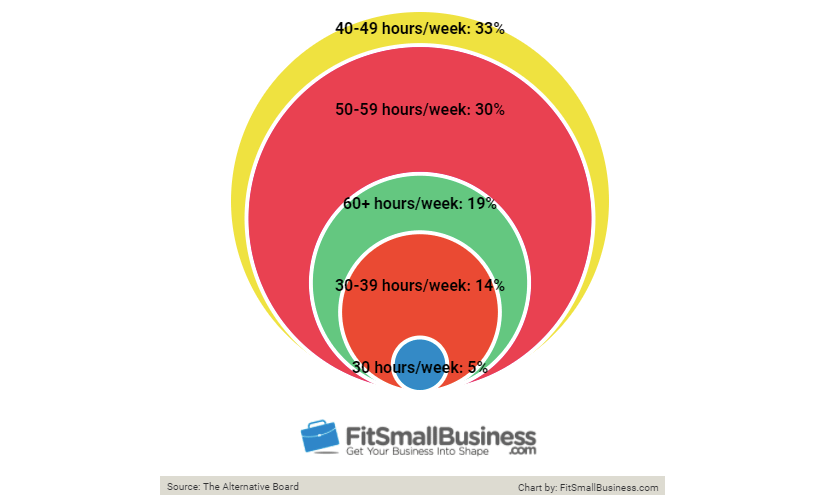When we spend time on tasks that don’t matter, that aren’t urgent or that shouldn’t be handled by us in the first place, we force our brains to carve out time for these new tasks. As more and more open items compete for attention in our brain, we, in turn, are prohibited from making any real progress.
So, let’s take a look at the four D’s of time management and how and why they’re essential for productivity.
Better Time Management = Greater Productivity
TAB’s 2017 Small Business Pulse Survey revealed two disappointing statistics as it pertains to business leaders and productivity.
First:
“84% of business owners are working over 40 hours per week and 1 in every 10 feels continuously overwhelmed by their responsibilities.”
Second:
“The average business owner reports having only 1.5 hours of uninterrupted, high productive time each day.”
And do you know what source business leaders attribute these low productivity levels to? Time management.

If you want to avoid becoming a victim of poor time management practices, then there are four D’s you have to master:
1. Delete
I know what you’re thinking:
“That task/reminder/meeting is on my list for a reason.”
But, is it? Are you holding onto professional or personal commitments in the hopes that someday you might have the time or interest to do them, only to let them take up valuable space on your list of things to do?
It’s time to get ruthless and delete the stuff that doesn’t matter, that adds no value to your business, that’s consuming more of your brain power than it deserves. It might come in the form of:
- Newsletter subscriptions you don’t read, but that still end up in your inbox every day.
- Personal projects you don’t need to work on right now.
- Client-related tasks that could easily be automated.
- Calendar entries that remind you to do things you’re already in the habit of doing.
- Bad clients that drag their feet on signing the contract and getting started.
This infographic from Atlassian goes a little deeper and says there are 3 time-wasters killing your productivity.
Email:

Meetings:

Or, in your case, these are the impromptu client calls that break you out of your rhythm.
And, finally, Interruptions:

All of these are incredibly expensive time wasters. If there’s anything you’re not using or that it’s not worth spending time on, get rid of it.
2. Delegate
As a business owner, you may be reluctant to hand off tasks to others. You’re not alone. More statistics from TAB show how widespread this poor time management trend is with business owners:

There’s a reason why only 19% work less than 40 hours a week.
44% of those surveyed said they would not delegate tasks to others. And the reasons for this might sound familiar:
- They can’t afford it.
- They don’t trust outsiders to do the work correctly.
- They believe that if they don’t do it, quality will be compromised.
- They don’t want to lose control.
- They’re nervous about confidentiality breaches.
As Laura Stack, The Productivity Pro, said:
“Yes, business owners could do it, but you are throwing money away if there is a low Personal Return on Investment (or PROI) in doing it yourself. The next time you consider assigning tasks to team members, think about what they should be doing with their time—as opposed to what would be a waste of time for them. If the task doesn't fit, delegate it, outsource it, eliminate it—or just learn to be satisfied with mediocrity.”
And as I always like to say:
“It doesn’t have to be perfect.”
Delegation doesn’t mean you’ll never see the task, communication or product again. It just means someone is helping you get closer to 100% than if you were to do it alone.
3. Defer
An often-cited report from the American Psychological Association entitled “Multitasking: Switching costs” comes with a warning:
Stop multitasking or it will cost you greatly.
The report breaks down a number of studies that show the deteriorating effect multitasking has on one’s ability to focus and produce. As your brain splits itself among more tasks, it can’t work as well or as quickly. In addition, one of the researchers noted that, “even brief mental blocks created by shifting between tasks can cost as much as 40 percent of someone's productive time.”
So, rather than fill your list with more tasks for the sake of having a “full” workload (or, at least, the perception of it), be reasonable. Add tasks to your list for today that actually need to be done now.
Tasks that aren’t due later this month? Push them out so you don’t have to be distracted by them on your calendar.
You can do the same with email. Did a client email you with a project they want you to start in six weeks? That’s fine.

Use a tool like Boomerang for Gmail or Spark to move it out of your inbox and have it appear at a point in time when it’s deserving of your attention.
4. Do
Finally, if you want to succeed in time management and be more productive, you have to start getting stuff done. In other words, take on those tasks that can’t be deleted, delegated or deferred and close the loop on them ASAP.
Wrap-Up
Really, what this boils down to is a change in mindset. You can’t expect to be good at time management and become more productive if you keep doing things the same as you always have.
If you’re serious about cutting through the noise and getting more stuff done, then you have to have fewer things on your list. The 4 D’s of time management will help you shave it down to a reasonable size.






